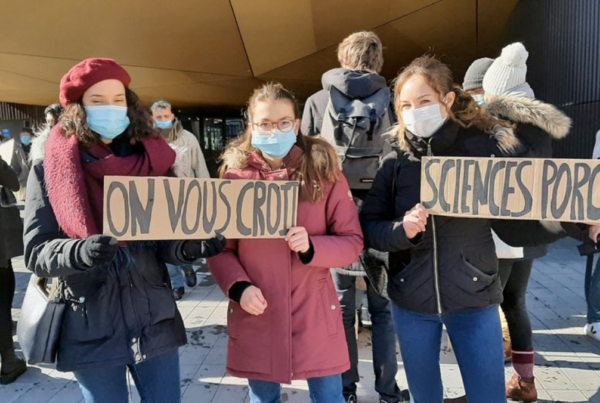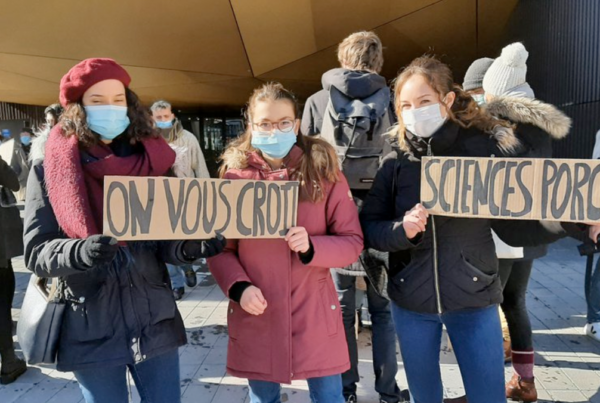No photos were taken during this General Assembly to preserve the anonymity of the organizers and the audience.
By Alice Coubronne and Maria Linares
On Thursday, 19th of April, students of Sciences Po Paris’ Campus of Reims gathered in the large amphitheatre on campus for an independently organized General Assembly. The goal of the assembly, as originally stated in the description of the Facebook event made, was “to undertake a discussion including exchanges, eurams and eurafs about the reforms of the government (public function, Vidal law, asylum and immigration law and SNCF reforms), of the protest movements and police repression.” However, the organizing committee went on to state that the original Facebook event had been removed from the website after being reported.
The amphitheatre began to fill up with students fifteen minutes before the General Assembly was scheduled to start. Students were encouraged to turn off their cameras or recording devices, as the organizers of the General Assembly wished to contain the discussion between the students who were present as well as protect any students who might choose to speak out against the administration.
The technical proceedings of the General Assembly were then explained in both French and English. Four moderators were assigned to keep order during discussion, holding a neutral position throughout the duration of the assembly. For voting modalities, students would have the option between four possible choices: they could vote for or against a proposal, choose to give a blank vote, or choose to abstain from voting. In the case of a majority of blank votes, the proposal would be discussed again and would indicate a desire for greater discussion and future general assemblies. The topic of voting methods was discussed for a substantial amount of time, with suggestions from students ranging from anonymous methods of paper ballots and electronic polls, to public methods such as standing, and raising hands. Ultimately, the assembly voted in favor of raising hands as the voting method.
By 6:45pm, the assembly moved to vote on the order in which the topics of discussion would be addressed. The proposed order of discussion was presented as follows: student positions regarding the government reforms, modes of action in solidarity with student movements, national strikes and blockades, the Traoré family, the Mirail Quartier in Toulouse as victims of police repression, ZAD (zone a defendre) as victims of police violence, immigrants searching for asylum, and finally the means of action that would be taken.
Three proposals were raised by students regarding the order of discussion. The first proposal was to start with a discussion of the possible means of action to be taken regarding the issues presented and immediately vote on them. The second proposal was to vote on means of action at 7:30pm, regardless of how much had been discussed about the multiple topics to be embarked. The final proposal was to follow the proposed order and continue until all topics had been discussed. The second proposal passed with a majority approval of 241 votes, with the third proposal receiving 70 votes and the first receiving 57 votes.
After reaching an agreement on these practical issues, the General Assembly turned to the order of the day, to present the context that had led to the mobilization. What was at stake here was the ORE law (“Loi sur l’orientation et la réussite des étudiants”), introduced by the French government to establish a selection process of prospective students in public universities. Highly controversial, this law has sparked student protests and occupations in some French universities. When the committee, which had called for and presided over the General Assembly, projected a statement on the law, reactions were swift and strong.
“The Vidal Law gives universities the possibility to refuse students on the base of arbitrary requirements. « Parcoursup », the new orientation platform, is thus a revision of free access to superior education which individualizes paths, and introduces de facto unequal mechanisms of concurrence between students. This reform will intensify the racist and classist logic of french education, making superior studies everless accessible to the working class.” – General Assembly projected statement.
The statement was criticized for being overly biased. Some students argued that it was an attempt at manipulating the vote, and requested that a summary or extract of the law itself be projected. Others thought that it would be better to rewrite the text objectively, to have students inform themselves on the issue, and to postpone the vote. Confronted with this opposition, the organizers recognized the bias, acknowledged the lack of preparation, and stressed the importance of a proper discussion of the situation.
The discussion shifted to the different modes of action to be taken as the clock neared 7:30pm. In order to avoid further bias, the Student Representatives were asked to moderate the rest of the discussion. Discussion focused largely on the potential of a blockade on the Reims Campus. It was unclear to many students whether a partial blockade of the University would result in a complete shutdown and/or evacuation. However, the Student Representatives confirmed that, according to Campus Director Tilman Turpin, even the occupation of a single classroom would result in the evacuation of the campus for security reasons. A letter distributed earlier that day from the Student Representatives reads “…in the event of an occupation of one space on campus, the rest of the Reims campus will be evacuated and closed for reasons of security until the end of the blockade.”
Debates grew in intensity during the discussions due to the multiple opinions on the topic. Some students stepped in to remind the organizers of the General Assembly that the majority of those present were there because they wanted to avoid a blockade which would prevent them from studying under normal conditions. Others implied that students were not considering the importance of the topic, stating that as students in a political science school, they should be asking questions, and despite their classes and responsibilities, they should not forget about real world events.
As time passed, the discussion was quickly wrapped up, and the different voting proposals that had emerged were outlined. Students would thus vote on four proposals: they could (a) vote for a total interdiction of any blockade until the end of the year, (b) reject the blockade but choose to act in solidarity with the activists, (c) accept the possibility of a blockade or (d) not take any action until the next General Assembly, which would be held before next Wednesday.
After the first proposal was rejected (132 votes in favour versus 154 votes against), the Student Representatives were unable to conduct a vote on the remaining proposals, as there were misunderstandings regarding the implications of the rejection of the first proposal. The rows of the amphitheater were quickly filled with chatter and disruption and as communication deteriorated and the clock neared 8pm, the possibility of adjourning the debate was brought up.
The prospect of another general assembly on Friday, Saturday or Monday was outlined, and the meeting was adjourned at 8:15pm after the Student Representatives promised to send out a poll to determine the time for the next general assembly.
Other posts that may interest you:
- The Trouble with ‘Ecocide’
- Carbon dioxide removal – hit or miss?
- Local Victories for Turkish Opposition — A Sign of Hope?
- Are France and Japan a Mismatch Made in Heaven?
- A Reflection on Dark Tourism
Discover more from The Sundial Press
Subscribe to get the latest posts sent to your email.



